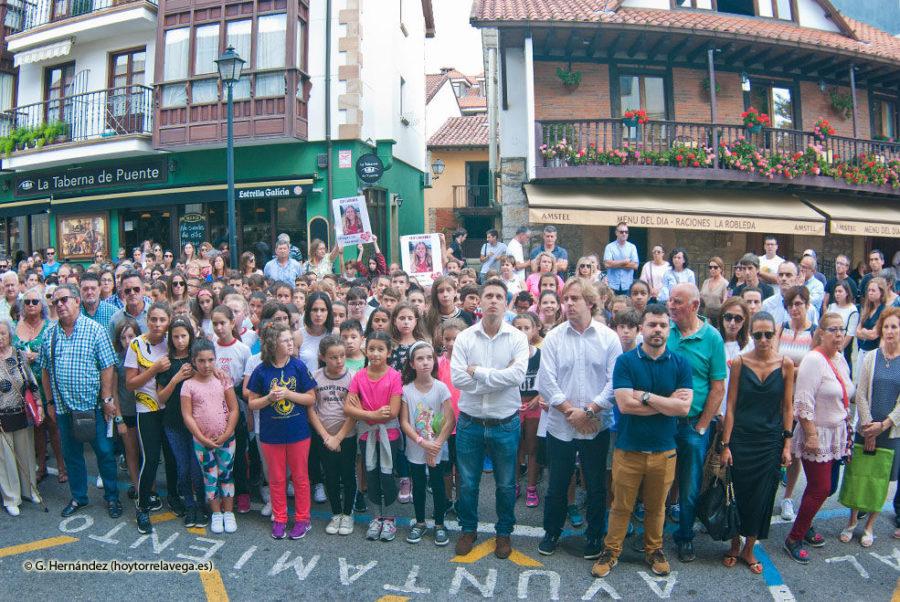- News
- News / Academics
- News / Politics And Administration
- News / Politics And Administration / Campus
- News / Politics And Administration / City
One year later: Ames’ response to the killing of Celia Barquín Arozamena
Photo courtesy of HoyTorrelavega
The citizens of Puente San Miguel, Spain mourn the death of Celia Barquin Arozamena.
September 16, 2019
The killing of Celia Barquín Arozamena on Sept. 17, 2018, made international news for its judicial and sporting perspectives, and led the Iowa State and Ames community to seek justice and answers.
Barquín Arozamena, 22 at the time she was killed, was a successful player for Iowa State’s women’s golf team. She had been scheduled to receive the Iowa State Female Athlete of the Year award less than a week after she was killed, and won the 2018 European Ladies Amateur Championship tournament.
Barquín Arozamena was a native of Puente San Miguel, Spain, and came to Iowa State a month into classes in her first semester, arriving late to the school year having been playing golf.
A civil engineering student in her last year at Iowa State, Barquín Arozamena had Jim Alleman, professor of civil, construction and environmental engineering, as an instructor for several classes in the department. After Barquín Arozamena was killed, Alleman said she had a memorable personality.
“She was incredibly outgoing. She had a smile that when she beamed it at you, she just lit up,” Alleman said at the time.
Police arrested Collin Daniel Richards and charged him with murder in the first degree in the killing of Barquín Arozamena.
Richards moved to change his plea from not guilty to guilty in March, writing a letter to the presiding judge saying, “I would like to take care of my case. I would like to do [whatever] it is to move forward ending the case, [plea] of guilty if it takes that […] Thank you & sorry I do plead guilty.”
Richards pleaded guilty to the charges in June and was sentenced to life in prison without the possibility of parole. He was ordered to pay $150,000 in victim restitution to Barquín Arozamena’s family in August.
Story County Attorney Jessica Reynolds released a quote from a statement the Barquín Arozamena family gave after the sentencing of Richards.
“[A] person is still alive as long as her memory is. During her life, Celia was an example of important values such as effort and constancy in her goals, friendship and love for those around her and a smile and positive attitude when facing daily problems,” her family said. “We cannot think of a better way to pay tribute to her memory than to have those values present in our daily lives in our hearts.”
Reynolds herself released a message in both English and Spanish that said, “[t]o Celia’s mother, father and brother, my heart breaks for your loss.”
Barquín Arozamena’s killing caused the wheels of government to turn as the public sought answers and the government sought to prevent a repeat of the tragedy. Richards was homeless at the time of Barquín Arozamena’s killing, and an acquaintance of his told police Richards had told him he had “an urge to rape and kill a woman,” police said on Sept. 18, 2018.
Richards was living in a homeless encampment near the Coldwater Golf Links in Ames, where Barquín Arozamena was killed.
The City of Ames created a committee on city safety in the wake of the killing of Barquín Arozamena, releasing a report on Public and Employee Safety on City Property in May.
Police Chief of the Ames Police Department Charles Cychosz noted in the report — released in May —there was a need to continue outreach to those experiencing homelessness.
“Another important area of action for us is a more coordinated effort to reach out to the homeless in our community,” Cychosz said at the time. “We are grateful for our partnership with the Emergency Residence Project … together we have a regular program of outreach in some of the areas where we suspect people may have a camp.”
The City of Ames tweeted late Monday to honor Barquín Arozamena, saying they are lighting U.S. 30 in yellow, her favorite color.
On Sept 17, 2018, our city lost Celia Barquin Arozamena. An accomplished ISU student athlete, Celia was kind, compassionate & beautiful. She was killed in a senseless act of violence.
We honor Celia’s memory this week w/yellow lights along US 30 – her favorite color. 💛🏌️♀️💛 #cba pic.twitter.com/8YfrMZm4rB
— City of Ames (@cityofames) September 16, 2019






